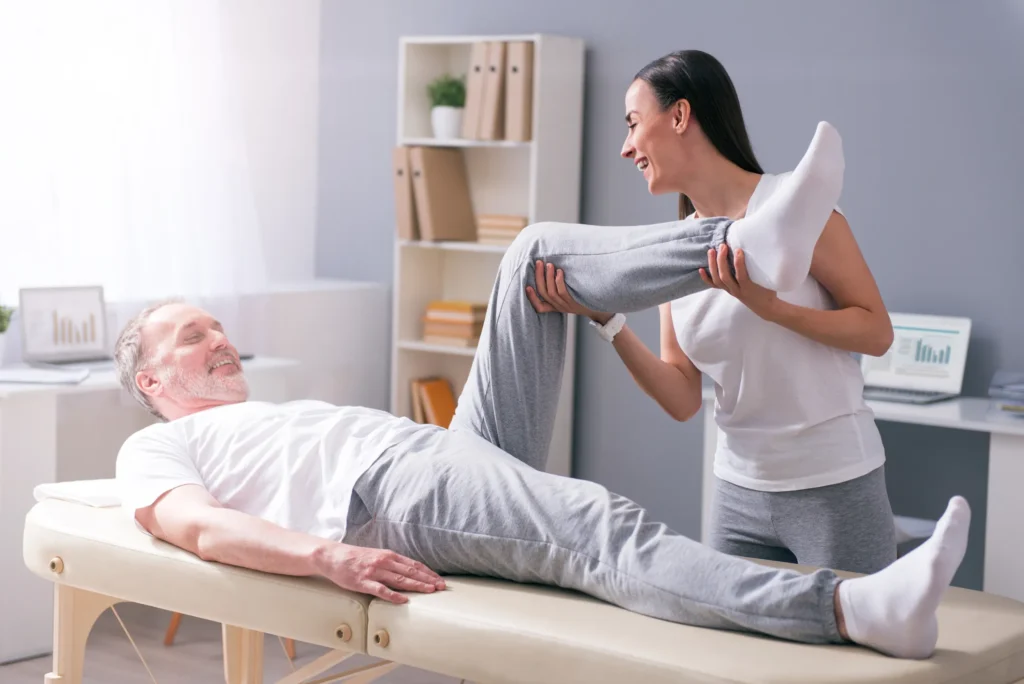Aging Gracefully: The Power of Physiotherapy for Seniors

As we grow older, our bodies change. We may start to feel aches and pains, have less mobility, or lose some strength and flexibility. This is a natural part of aging, but that doesn’t mean we must accept declining quality of life. Physiotherapy offers seniors a way to counteract some of the effects of aging, restore function, manage chronic conditions, and continue living active, engaged lives.
Understanding the Aging Process
To understand how physiotherapy can help seniors, it helps first to understand some of the physical changes that occur as we age:
Reduced Muscle Mass
We reach peak muscle mass at around age 30. After that, we lose roughly 3%-5% per decade. Less muscle means less strength for daily activities.
Stiffer Joints
Our tendons and ligaments stretch less over time. Joints lose lubrication. Cartilage wears down. These factors reduce flexibility and shock absorption.
Decreased Balance
Aging affects the vision, vestibular, and proprioception systems that govern balance. Loss of strength, flexibility, and stamina also play a role.
Slower Reflexes
We lose fast-twitch muscle fibres as we age. This makes reflexes slower, increasing the risk of falls.
These changes impact mobility, function, and independence. Chronic conditions like arthritis or heart disease can further exacerbate the effects of aging.
The Role of Physiotherapy
Physiotherapy provides proven ways to counteract some inevitable effects of aging. Treatments aim to restore and maintain mobility, build strength, and prevent injury. Goals centre around function and quality of life.
With regular physiotherapy, seniors can:
- Build muscle mass and improve strength
- Increase joint flexibility and range of motion
- Improve balance and stability
- Reduce pain and stiffness
- Increase aerobic capacity and endurance
- Learn how to prevent falls and manage chronic conditions
- Maintain independence longer
In some cases, physiotherapy facilitates recovery after joint replacement or cardiac surgery. It can mean the difference between aging in place or requiring care in a nursing facility.
Tailored Treatment Plans
Experienced physiotherapists design personalized treatment plans to meet seniors’ unique needs. After a thorough assessment, they create integrated programs incorporating:
Flexibility and Range of Motion Exercises
Stretching, yoga, tai chi, and other programs improve mobility in areas prone to stiffness, like hips, knees, and shoulders. This also decreases injury risk.
Muscle Strengthening
Weight training builds lean muscle mass to support daily functions. Exercises focus on major muscle groups. Equipment adaptations make strength training accessible for all ability levels.
Balance and Coordination Activities
Balance boards, stability cushions, treadmill walking, agility drills, Tai Chi forms, and obstacle courses are engaging ways therapists train proper gait mechanics, upright posture, dynamic stability, and overall steadiness. Progressions start seated and standing, then incorporate purposeful movement. Goal-based games make it fun! This functional training bolsters seniors’ physical stability and confidence in moving about their environments, whether at home, in the community, or transition. It also counteracts the fear of falling, which further limits activity. Minor improvements translate into significant differences in safe mobility and sustaining independence with daily tasks.
Manual Therapy
Hands-on massage, joint mobilization, and soft tissue release decrease muscular tension. They also reduce stiffness in connective tissue and joints that restricts movement and causes discomfort. Additionally, manual therapy warms tissues, enhancing blood flow and promoting healing. Simple human touch and caring interaction provide comfort, connection, and motivation during treatment sessions. Attention and encouragement from knowledgeable physiotherapists give seniors assurance that their health matters.
Patient Education
Lifestyle changes related to exercise regimens tailored for seniors, home safety evaluations and modifications, multi-faceted fall prevention plans, utilization and training on assistive devices, and holistic chronic condition management complement the personalized physiotherapy treatment plans. Additional education on nutrition, stress reduction techniques, cognitive health, and community mobility resources help motivate and empower seniors to protect their independence.
Continuing Care Options
Seniors benefit from ongoing physiotherapy support from physiotherapists aged care. Many choose periodic tune-up visits after finishing initial treatment plans. Retirement communities or aged care homes often offer balance, flexibility, and adapting activities classes. Some facilities have therapists on staff designing continuing programs catered toward residents.
For seniors, faithful physiotherapy sustains daily functioning, prolongs independence, and powers active lifestyles. Small investments yield significant dividends like improved strength, mobility, confidence and longevity. It’s never too late to start aging both gracefully and powerfully.
